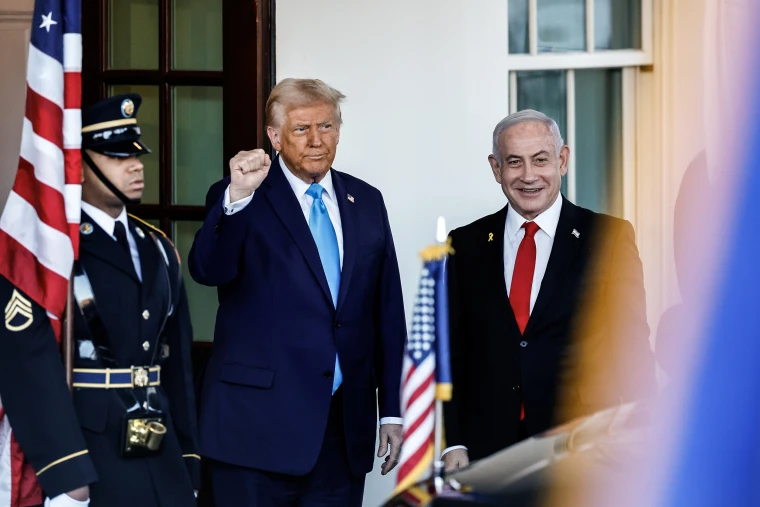Donald Trump’s proposal regarding the Gaza Strip has sparked widespread controversy and debate. His plan suggests that the United States should assume control over Gaza, relocate its Palestinian population to neighboring countries, and transform the area into what he envisions as the “Riviera of the Middle East.” While the proposal is ambitious, it raises significant legal, ethical, logistical, and geopolitical concerns, making its feasibility highly questionable. The idea of forcibly moving two million people from their homeland is inherently problematic, given the strong historical and emotional ties Palestinians have to Gaza. Furthermore, such a move would be widely regarded as a violation of international law, with potential accusations of ethnic cleansing. The practical implementation of this proposal faces immense hurdles, as no neighboring country has shown willingness to accept such a mass influx of displaced people.
The plan also ignores the deeply entrenched historical and political complexities of the Israeli-Palestinian conflict. The conflict in Gaza is not just about economic development or infrastructure but is fundamentally tied to national identity, territorial disputes, and decades of struggle. Trump’s suggestion that economic incentives alone could resolve the issue oversimplifies the deeply rooted grievances of the Palestinian people. Any solution that disregards Palestinian self-determination and aspirations for statehood is likely to face significant resistance, not only from Palestinians but also from the broader international community. The two-state solution, long supported by the United Nations and most world powers, envisions Gaza as an integral part of a future Palestinian state. Trump’s proposal, by contrast, completely undermines this framework, making it politically untenable.
Another major challenge to Trump’s proposal is the reaction of key regional players, particularly Egypt and Jordan. Both countries have explicitly rejected the idea of absorbing large numbers of Palestinian refugees, citing concerns about their own national stability and security. Egypt, in particular, has strongly opposed any attempts to push Palestinians into the Sinai Peninsula, warning that such a move could destabilize its relations with Israel and jeopardize the long-standing peace treaty between the two nations. Jordan, which already hosts a significant Palestinian refugee population, has also made it clear that it will not accept further displacement of Palestinians. The unwillingness of these key regional stakeholders to participate in the plan severely limits its feasibility and raises doubts about its practicality.
From a geopolitical standpoint, the proposal is likely to face intense opposition from the international community. The forced removal of an entire population would likely trigger global condemnation and diplomatic backlash. The European Union, the United Nations, and numerous human rights organizations have consistently opposed any measures that involve the forced displacement of Palestinians. Many analysts argue that such a move would not only violate international law but also inflame tensions in the region, potentially leading to further violence and instability. Additionally, Israel itself may not be fully aligned with Trump’s vision, as it would face significant diplomatic and security ramifications if such a drastic plan were pursued. While Israeli Prime Minister Benjamin Netanyahu has welcomed strong U.S. support, he has not openly endorsed Trump’s Gaza proposal, likely due to its impractical nature and the severe consequences it could bring.
Economically, the transformation of Gaza into a prosperous region under U.S. control would require enormous financial investment and international cooperation. The region has suffered from years of conflict, blockade, and economic hardship, leaving its infrastructure in dire condition. Rebuilding Gaza into a thriving economic hub would necessitate billions of dollars in investment, as well as a stable and secure environment—something that has been absent for decades. Given the opposition to the proposal, it is unclear where this funding would come from. The U.S. alone is unlikely to shoulder the financial burden, especially considering domestic political opposition and competing priorities. The notion that private investors or Middle Eastern nations would fund such a project also seems far-fetched, given the widespread rejection of the plan by regional players.
Another major obstacle is the potential reaction of the Palestinian population itself. Historically, Palestinians have shown strong resistance to displacement, and there is little reason to believe that they would willingly leave Gaza, even if offered financial incentives. The deep-rooted connection to their homeland, coupled with decades of struggle for self-determination, makes the likelihood of voluntary relocation extremely low. Any attempt to forcibly remove Palestinians from Gaza would almost certainly be met with significant resistance, possibly escalating into widespread unrest and violence. This, in turn, would further destabilize the region and potentially draw in other actors, including militant groups and neighboring states. The humanitarian consequences of such an approach would be severe, leading to massive displacement, loss of livelihoods, and increased suffering for an already vulnerable population.
Historically, various proposals have been put forward to address the Gaza situation, but none have suggested such an extreme approach as complete U.S. control and mass relocation. Previous peace efforts have focused on negotiations, economic development, and security arrangements rather than forced displacement. The international consensus has long been that any resolution must involve Palestinian participation and leadership. By excluding Palestinians from the decision-making process and imposing an external solution, Trump’s plan contradicts established diplomatic efforts and risks further entrenching hostility and mistrust.
Given these substantial legal, logistical, and political obstacles, it is highly unlikely that Trump’s proposal could be implemented in any practical sense. The overwhelming opposition from Palestinians, neighboring countries, and the global community suggests that the plan lacks viability. Furthermore, its potential consequences—ranging from diplomatic fallout to regional instability—make it an unworkable and dangerous proposition. Rather than fostering peace, the proposal could exacerbate tensions and prolong the suffering of those affected by the conflict. As such, the idea remains more of a provocative statement than a feasible policy solution, with little chance of gaining traction among serious policymakers or regional stakeholders.





Leave a Reply